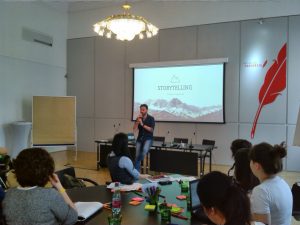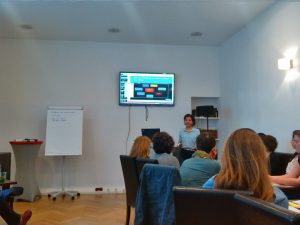I recently had the opportunity to participate in a workshop on ‘Developing counter-narratives’ organised by the Media Against Hate campaign, a joint effort of organisations such as the European Federation of Journalists, ARTICLE 19, Media Diversity Institute, Croatian Journalists’ Association, Cooperazione per lo Sviluppo dei Paesi Emergenti (COSPE), Community Media Institute (COMMIT) and Community Media Forum Europe (CMFE).
Tim Verheyden and Mukti Jain Campion, storytelling experts from Belgium and the UK, delivered sessions on, respectively, tools for an effective storytelling – providing examples and tips for effective narratives that connect with the audience – and inclusive approaches to storytelling and how to ensure that minorities are adequately represented in the media.


The overall loose frame of the workshop on how to counter hate speech came to prominence with the talk of Daniela Kraus and Ingrid Brodning, which focused on strategies to reply to hateful comments in online debates.
Participants ranged from journalists and media professionals to NGOs officers, social initiatives founders and community media organisers, and the variety of backgrounds and expertise allowed for a fruitful and rich exchange, though it could have been better taken advantage of during the sessions themselves.
Refugees-related issues were a central part of the discussion, as was to be expected. However, there seemed to be little understanding of the issues at stake and even less willingness to provide refugees with a voice and a possibility to tell their own stories – contrary to what was taken for granted in other cases. The choice of specific examples (even the ones considered ‘good storytelling techniques’) and the ensuing debate made it clearer than ever that there is still a lot of work to be done, and that the project Refugees Reporting comes at an extremely appropriate time.
It was no surprise then, that in the examples where those directly affected by the issue where given an opportunity to be involved in the process of content creation, they were able to provide the most creative and unexpected solutions of all. Such as the journalist working in Austria, who decided to challenge all the hate speech commentators on his articles by inviting them to meet with him in person, and who will write a piece on his meeting with a ‘brave young man’ (in his words) who was the only one who agreed to meet him.
Or the unexpected connection which was shared by the radio commentator living in Luxembourg, who clearly knew her Syrian history much better than anyone else in the room, and was able to – simply and effectively – track European descent to Syrian blood, because as Europeans, we mostly come from the same Mediterranean basin and as such, today’s borders and prejudices are not only completely unfounded, but also absolutely unnecessary once we understand our common history.
The most important lesson of the workshop became thus crystal clear: when talking about an issue, the most important thing to do is to talk with those who are affected by the issue itself. There is no better way to talk about refugees-related content than to talk with refugees.
